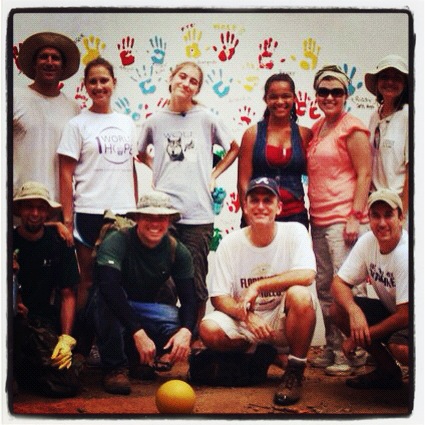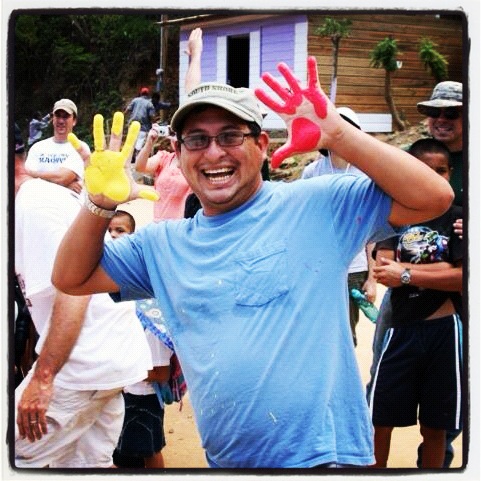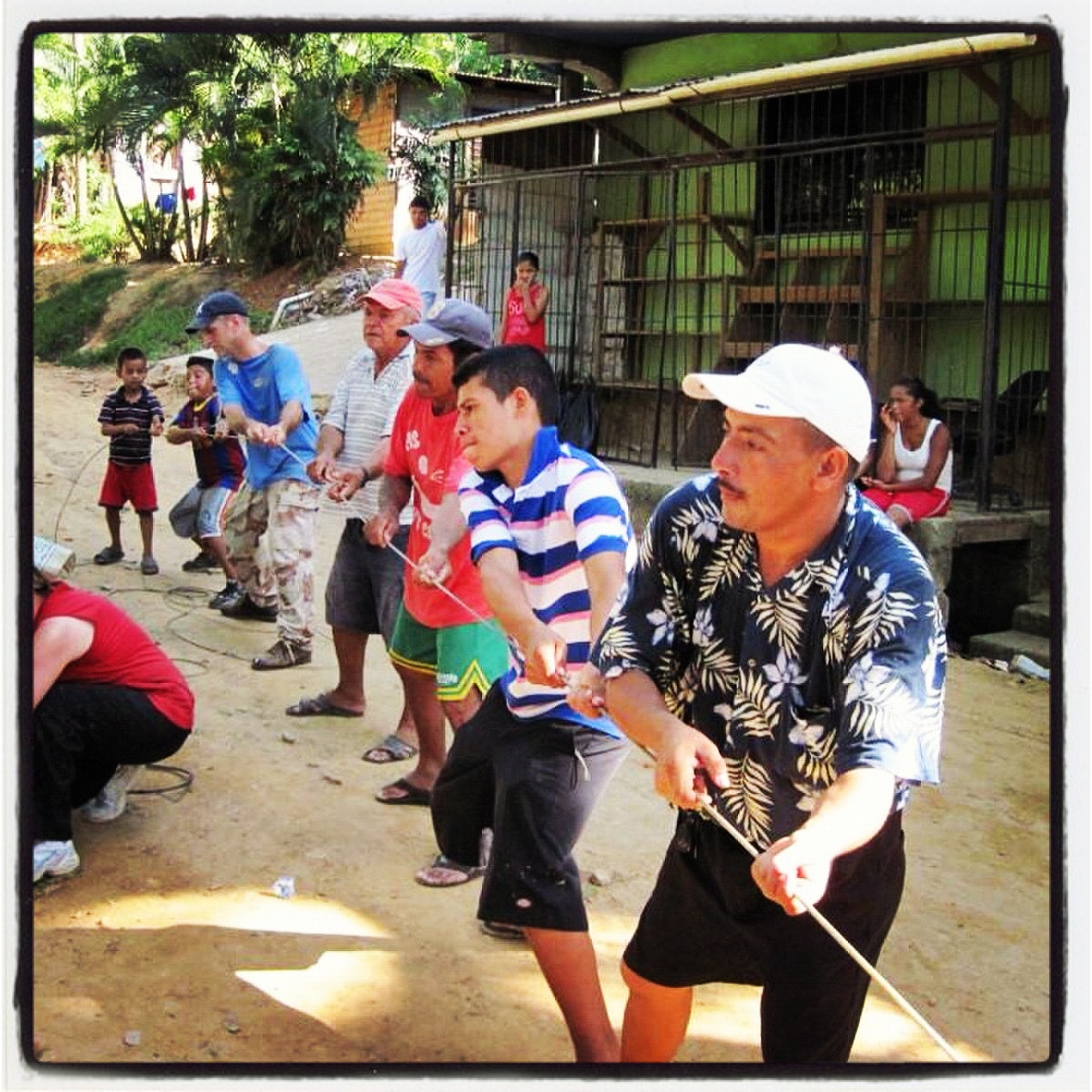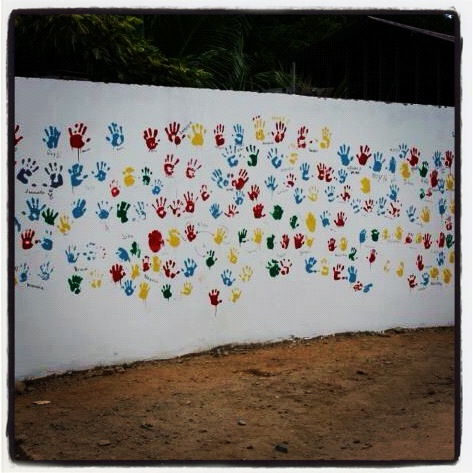
Day 6. It’s handprint day. Brightly colored paints wait in containers at the newly whitewashed wall. I’m not sure the kids quite know what to make of it, the dipping of hands into the thick, drippy paint. Our Spanish is lame, and we communicate mostly in sign and gesture and badly pronounced vocabulary. But the kids get the hang of it soon enough. The wall quickly fills with sets of hands that we identify by name with a black marker. They’re leaving their mark on this wall, on this community. “I am here,” the handprints seem to say, “and I matter.”
Before long, a man who is working as part of a construction crew walks over, drawn by our activity at the wall. He wants to know if he can make his handprints too. He is gesturing to the paint and wall. We’re quick to oblige, and the paint dribbles down the wall from his wet prints and reflects the morning sun already high on the wall.

It was Mike’s idea, this wall of handprints. And it’s one of the best marks we’ve left here, other than the deep well up the road. On this wall, dozens of children have claimed their community, their handprints a testament to their value and place here, their role in their own tomorrow. All the investments of time by caring people in this community are directed towards this young generation of future leaders. With Christ, we hope they can begin, one by one, to break the chains of poverty.

One set of handprints sticks out among the others. They belong to Enrique who has driven us up and down this road all week, who has poured his life and heart into these kids. I wrote yesterday of how Henry and Francis had come to Roatan, how their hearts got “ruined” by its needs and have been here working on behalf of these kids ever since. But I haven’t written Enrique’s story, and it’s equally great.
Enrique was a go-getter and, being good at speaking English and outgoing, had built himself a lucrative tourism business on Roatan. He operated a taxi service and led tours for visitors and groups. He was doing well by most standards.
One fateful day, however, Enrique’s story would intersect with the story of a couple from Jacksonville, Florida, a couple who would get off a cruise ship, amble to his waiting cab and ask for a tour of the “real Roatan.” Enrique would meet Henry and Francis, show them the nooks and crannies of his home island and return them to the cruise ship. What he didn’t expect were the events that would follow.
Enrique’s business got into trouble and quickly began to spiral downward. He lost everything. And somehow in this state of loss, he found Jesus. I don’t remember his story with enough detail to say if he’d known Jesus and somehow came home to him after an absence or if he met Jesus for the first time, but I do remember that losing everything and Jesus came together significantly for Enrique and his family. And his life began to get ruined in a similar way that those American tourists’ were ruined when he drove them around the island. Enrique’s heart was getting stirred. Henry would say, “God was messin’ with him.”
Henry, who had since moved to Roatan with his wife, kept after Enrique, the man who in part was responsible for his ending up here. And between God “messin’” with Enrique’s heart and Henry’s persistence, Enrique decided to work with Henry and Francis, sharing the Gospel with kids and teaching them God’s Word. He now does this every day and has been trained to bring the Spanish version of Awana Clubs into la Colonia. On top of that, he is the guide and interpreter for the many teams that come from the States and put on Bible clubs or do construction projects.
I love Enrique’s story. I love the handprint of God on his life, how God orchestrated two stories to connect and intertwine on behalf of a community. I love that Enrique’s hands are on that wall because he has and is making a mark here. God’s love has compelled him.


The paint is beginning to dry on our wall, but yesterday while I stayed back with Bailey, exciting things happened at the pump house. One of my teammates, who sits with me now in front of our wall of hands, shows me the picture of yesterday’s events on her camera. Before they sunk the pump, they had to pull up an old broken one so that the new one could be dropped. In the picture, a train of hands is grasping the rope and pulling. They are a mix of hands, old and young. Some belong to our team, but most of them belong to the community, having stopped en route to somewhere to join the work.
I think of how it is always hard work to pull up something that is broken or that hasn’t worked. The old has to make way for the new. Getting ruined, like Henry and Francis and Enrique, is painful and hard. Changing the social structures that enslave a people to poverty is complex and overwhelming. But then there are these hands, clutching a rope with determination, marking a white wall with color and hopefulness. Like the work of Jesus in this place, it is the hands of this community that will bear the work of leading each other to the water. I whisper a prayer that these beautiful hands will draw not just clean water from a well but living water from Jesus, the source of life. May the people of this place be truly satisfied and never thirst again. And may those of us who have been blessed to see these hands not cower at our own hard work ahead. I pray for my own hard places and the courage to let God ruin me in a way that welcomes the new.
